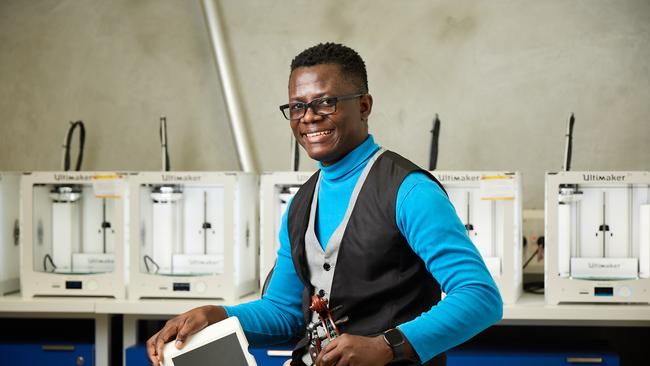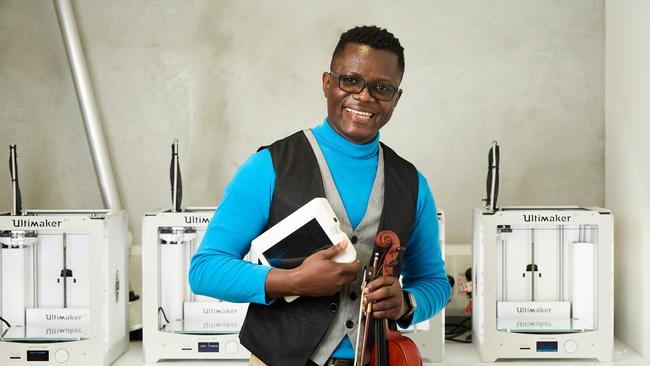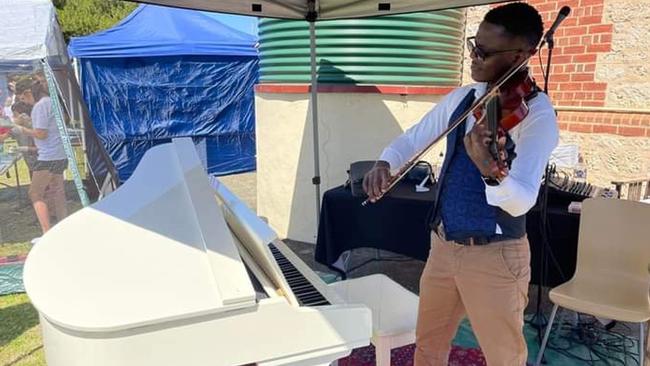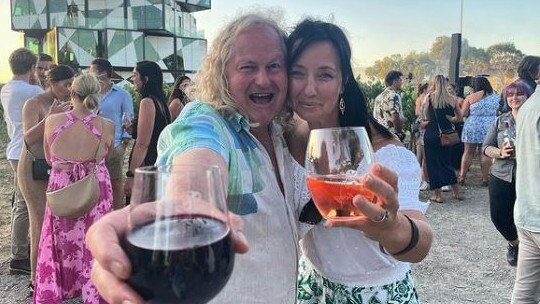Doctor, inventor, musician and international student: Why Elvis Chidi-Ezeama can’t get a gig in SA
Elvis is a doctor, inventor, humanitarian and volunteer. He’s studying for his Masters. He helps the disabled. And he can’t get an engineering job in Adelaide for one infuriating reason.

Opinion
Don't miss out on the headlines from Opinion. Followed categories will be added to My News.
We need to talk about Elvis.
Not the King of Rock and Roll, but Elvis Chidi-Ezeama.
You may remember reading about this inspiring Nigerian-born physician who moved to Adelaide, just before Covid did in 2019, to study a Masters in Biomedical Engineering at Flinders University.
The reason? He’d watched too many people die from malaria in his home country and was frustrated by the lack of answers, despite centuries of heartbreak.
Malaria is curable and yet a child under the age of 5 dies from it every minute, somewhere in the world.

“Nobody is solving these problems so I decided instead of sitting around and waiting for someone else to fix it, I should come here to study and learn how to do it for my people,” Elvis says.
“I think I had something in my head that said if you are not the guy who will do this, then who will?”
And so, during his three years at Flinders, Elvis invented an affordable and rapid device to detect malaria and offer treatment options.
He topped the course and was awarded the 2022 StudyAdelaide International Student of the Year award for his brave innovation.
He was recognised for his “thirst to learn”, “positive outlook and inner drive” and his “rare blend of medical and engineering skills”.
He’s hopeful the lifesaving malaria device will soon be commercialised and one day used to detect other neglected tropical diseases.
Like so many other international students who come to Adelaide, Elvis has fallen in love with our great city.
He loves the climate, the ease of getting around, the clean air, our parks and our beaches.
And he loves us. The people of South Australia.
“Everyone is so friendly and supportive. I felt at home with the people immediately, I met friends and I got into the community quickly,” he says.

And it’s no wonder he got into it. Along with 37 per cent of South Australia’s international student population, Elvis volunteers here. A lot.
Through his local church group, he’s spent hundreds of hours helping South Australians in need.
After the devastating Kangaroo Island bushfires he helped distribute food hampers, pruned vines and assisted with free health checks for local residents.
He still visits KI at least once a month to catch up with the families the hampers were distributed to.
Just like his namesake who showed an early fondness for gospel music, Elvis regularly plays the violin in free concerts across the city.
And to make ends meet and pay for his Masters, he’s worked for four years as a disability support worker, caring for South Australians in their homes.
But here’s the thing. Elvis can’t get a job in South Australia as an engineer.
You’d think our dire skills shortage would have employers crying out for rock stars like Elvis and his study friends – but they’re not.
Many apply for jobs and don’t even get an interview.
Elvis is currently on a graduate visa, and he believes that’s part of the problem.
“As soon as you get your permanent resident visa then everybody wants you to work,” he says.
“This is not just about me, this is every other international person I’ve studied with.
“I know I’m welcome here and that makes me want to stay but if I can’t get a job, I’ll have to start looking somewhere else.
“It’s frustrating because I know I can do good things here.”
Elvis applied for permanent residency in February. He’s still waiting for news from the federal government. The clock is ticking.
To be fair, biomedical engineering jobs don’t come up every day in SA but it’s the same, frustrating story for thousands of international graduates in other fields like accountancy, IT and allied health.
StudyAdelaide chief executive Jane Johnston says Elvis’s story is not an isolated one.
“It’s part of a wider misunderstanding across the business community about the talent international students offer businesses as well as the ease of employing an international student upon graduation,” she says.
“I think businesses have a misconception that there are processes they have to undertake or that it’s complex, rather than the reality which is that it’s as easy as employing a local.”
It’s time to have a major rethink about how we can support these graduates and benefit as a state.
Employers need to recognise the skills they’re willing to share along with the social and cultural benefits.
They offer an instant connection to offshore markets, opening doors to trade and investment opportunities.
And they actually want to work. They come here for that reason – to learn and then to hopefully get a job.

If we want South Australia to truly grow, prosper and thrive we need to roll out the welcome mat and give our international students a reason to stay here.
Our regions are leading the way in embracing them and it’s a win-win situation.
The graduates are getting good jobs in welcoming communities and our rural cities and towns are getting diverse, loyal and committed workers who often bring a partner and young children with them.
They are engineers and project managers in our mining regions, tourism and hospitality workers, and desperately needed doctors, nurses, social workers, aged care workers and occupational therapists.
And let’s not forget the tourism benefits these students bring.
More than 60 per cent of our international students’ families and friends have either visited or are planning to visit South Australia.
Austrade’s head of international education Melissa Banks recently told a senate inquiry examining tourism and international education that 69 per cent of the money that comes into Australia for tourism is via international education and visitors to students here – 69 per cent! It’s a staggering figure.
Without international education, she said, we effectively have an international tourism sector one-third its current size.
Forget the Sam Smith concert social media influencers – Elvis and his mates are full-time, true blue ambassadors for our state and we don’t pay them a single cent.
Family members including his father and brother have been to visit in the past 12 months. They’ve spent thousands on accommodation, food and experiences in our city and regions, and they’re telling their friends about us.
A friend of mine and her sister came here from Malaysia to study more than two decades ago.
One now part-owns a busy southern suburbs pharmacy, the other helps to run an award-winning Barossa Valley winery. They call South Australia home, and it is their home.
Their parents and sister visit them twice a year, supporting our restaurants, hotels and wineries. Aunties, uncles and cousins have all visited too.
International education is one of South Australia’s biggest export sectors. The 2021-22 figures show it brought in an eye-watering $1.424 billion dollars.
The number of young people from 120 countries currently living and studying here is 43,530.
We’re rebounding strongly from Covid with enrolment numbers up from 40,489 in 2021 and our growth is way ahead of the national average.
With a university merger on the horizon, now is the time to think big on the opportunities for our state.
We are staring one solution to our skills shortage right in the face. Why let Sydney, Melbourne and Brisbane pick off these bright young stars who’ve learnt much of what they know in our city?
Elvis wants to stay in Adelaide but if we don’t wake up, we may just find he’s left the building.





